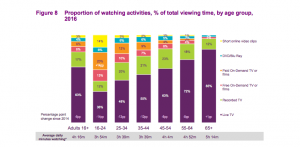
After more than 40 years of operation, DTVE is closing its doors and our website will no longer be updated daily. Thank you for all of your support.
Ofcom: TV viewing time down as ‘generation gap’ widens
 TV viewers in the UK now watch 26 minutes less per day than they did in 2010 and there is a “widening generational gap” in viewing habits, according to Ofcom.
TV viewers in the UK now watch 26 minutes less per day than they did in 2010 and there is a “widening generational gap” in viewing habits, according to Ofcom.
The UK broadcast regulator’s ‘Public Service Broadcasting Annual Report 2016’ claims that people under 25 are watching around 25% less broadcast TV than in 2010, while the average viewing of those aged 55-64 has declined by 5%.
Those aged 16-24 have “particularly embraced on-demand services”, with live TV accounting for just 36% of daily viewing, a 14 percentage-point decrease in two years.
“TV viewing on TV sets has fallen substantially in the last five years, with a widening gap between the viewing habits of the youngest and oldest audiences,” said Ofcom.
“Among all those who have a TV set in the home, lower proportions of people under 35 watch TV in a typical week, compared to older age groups.”
On average, people in the UK watched 3 hours 36 minutes of measured broadcast TV in a typical day in 2015, compared to 4 hours and 02 minutes in 2010.
Ofcom said that taking a ten-year view, daily viewing looks resilient, but this is because the oldest viewer groups have propelled viewing figures, while there are “marked declines” in viewing among all other age groups, including children.
The average weekly reach of total broadcast TV is 82% among those aged 16-24, compared to 97% for adults aged 65 and older.
“One of the potential reasons for the decrease in viewing among younger age groups is the increase in popularity of on-demand services. Around six in ten adults now use on-demand services such as BBC iPlayer, All 4, Netflix or Amazon, with reach rising to around seven in ten among 15-24s and 25-34 year olds,” according to the report.
Ofcom said that the main five public service channels provided by public service broadcasters (PBSs) reached 84% of the TV population in a typical week, and accounted for 51% of all broadcast TV viewing in 2015.
This share is similar to the last three years, but represents a decline from ten years ago when PSBs held a 70% share of viewing.
The PSBs spent £2.50bn on new UK programmes on their public service channels in 2015, a 2% increase since 2013; the most recent comparable year due to the absence of major sporting events.
Some 73% of viewers said they were satisfied with PSB public service broadcasting overall, while 7% were dissatisfied.
“Our research shows that UK audiences still watch and value public service broadcasting. But there are significant differences in the viewing habits of older and younger audiences,” said Jane Rumble, Director of market intelligence at Ofcom.
“As media and technology continue to evolve, it is important that broadcasters respond to these changes, so they can keep meeting the needs and expectations of viewers.”
Separately, Ofcom chief executive Sharon White said that the BBC should “reflect the nation in all its diversity” once its new charter comes into effect in 2017, in an interview published today by the Guardian.


